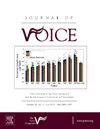标准化行为治疗可改善慢性咳嗽。
IF 2.5
4区 医学
Q1 AUDIOLOGY & SPEECH-LANGUAGE PATHOLOGY
引用次数: 0
摘要
目的:神经源性喉高敏症(NLH)是指一种上呼吸道症状,被认为是由传入和/或传出神经通路紊乱引起的夸张性喉高敏反应。有证据表明,行为疗法可改善从喉运动功能障碍到感觉障碍的症状。本研究旨在确定接受由训练有素的SLPs实施的非药物行为治疗的NLH患者的症状是否有明显改善:研究设计:回顾性研究:一家三级护理嗓音和吞咽中心对 2017 年至 2020 年的所有 NLH 患者进行了回顾性研究。研究对象包括在接受最大限度的药物治疗后仍有持续症状的患者。患者在接受三名训练有素的嗓音和吞咽治疗师中的一名治疗前后,填写了纽卡斯尔喉过敏问卷(NLHQ)。根据 NLHQ 的最小临床重要差异 1.7 点来确定治疗后的改善情况:本研究共纳入 81 名患者。研究参与者包括 61 名女性和 20 名男性,平均年龄(60.64±14.05)岁。在接受每位 SLP 和所有三位 SLP 治疗时,所有患者治疗前和治疗后的评分均有显著的统计学差异(P < 0.008)。在所有患者中,有 66% 的患者出现了有临床意义的变化,其中 76% 的患者 NLHQ 分数异常,14% 的患者 NLHQ 分数正常:结论:对有 NLH 症状的患者采用标准化行为治疗方案可有效改善大部分患者的症状。在遵循标准化方案的情况下,SLP 可以为患者获得类似的效果。本文章由计算机程序翻译,如有差异,请以英文原文为准。
Standardized Behavioral Treatment Improves Chronic Cough
Objectives
Neurogenic Laryngeal Hypersensitivity (NLH) refers to a constellation of upper airway symptoms thought to be caused by a disturbance in afferent and/or efferent neural pathways creating an exaggerated hypersensitive laryngeal response. There is evidence to support behavioral therapy as treatment for improving symptoms from laryngeal motor dysfunction to sensory disturbance. This study aims to determine if there is significant symptomatic improvement in patients with NLH who received non-pharmacologic behavioral treatment performed by trained SLPs.
Study design
A retrospective review.
Methods
A review of all patients with NLH from 2017 to 2020 was performed at a tertiary care voice and swallowing center. Subjects with persistent symptoms despite maximal medical management were considered for inclusion. Newcastle Laryngeal Hypersensitivity Questionnaire (NLHQ) was completed by patients before and after undergoing therapy by one of three trained SLPs. Posttherapy improvement was determined by utilizing the NLHQ's minimal clinically important difference of 1.7 points.
Results
A total of 81 patients were included in this study. Study participants included 61 women and 20 men with an average age of 60.64±14.05 years. There was a statistically significant difference between the pre and post therapy scores amongst all patients when treated by each individual SLP and all three SLPs combined (P < 0.008). There was a clinically significant change in 66% of all patients, 76% of which presented with abnormal NLHQ scores, and 14% who presented with normal NLHQ scores.
Conclusions
A standardized behavioral treatment protocol for patients with symptoms consistent with NLH is effective in improving symptoms in a large majority of patients. When following a standardized protocol SLPs can obtain similar results for their patients.
求助全文
通过发布文献求助,成功后即可免费获取论文全文。
去求助
来源期刊

Journal of Voice
医学-耳鼻喉科学
CiteScore
4.00
自引率
13.60%
发文量
395
审稿时长
59 days
期刊介绍:
The Journal of Voice is widely regarded as the world''s premiere journal for voice medicine and research. This peer-reviewed publication is listed in Index Medicus and is indexed by the Institute for Scientific Information. The journal contains articles written by experts throughout the world on all topics in voice sciences, voice medicine and surgery, and speech-language pathologists'' management of voice-related problems. The journal includes clinical articles, clinical research, and laboratory research. Members of the Foundation receive the journal as a benefit of membership.
 求助内容:
求助内容: 应助结果提醒方式:
应助结果提醒方式:


